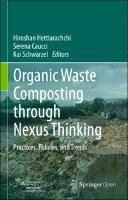Organic Waste Composting through Nexus Thinking
Practices, Policies, and Trends
| dc.contributor.author | Hettiarachchi, Hiroshan | |
| dc.contributor.author | Caucci, Serena | |
| dc.contributor.author | Schwärzel, Kai | |
| dc.contributor.editor | Hettiarachchi, Hiroshan | |
| dc.contributor.editor | Caucci, Serena | |
| dc.contributor.editor | Schwärzel, Kai | |
| dc.date.accessioned | 2020-12-14T08:26:44Z | |
| dc.date.available | 2020-12-14T08:26:44Z | |
| dc.date.issued | 2020 | |
| dc.identifier | ONIX_20201214_9783030362836_3 | |
| dc.identifier | OCN: 1225067177 | |
| dc.identifier.uri | https://library.oapen.org/handle/20.500.12657/43265 | |
| dc.description.abstract | Organic waste composting is another excellent example to demonstrate the power and the benefits of nexus thinking. Even though organic waste composting itself is not a new topic, those who want to start a new project or align an ongoing project with nexus thinking, find it difficult to gather the necessary information. With nine case studies from four continents, this book aims to fill above gap in literature. While current literature on composting is often found to be limited to either soil/agriculture sector or waste management sector, this book presents a combined point of view. This open access book starts with an introductory chapter that describes the need to bring the waste management aspects and soil nutrient management aspects of compost production into one integrated theme. The relevance of nexus thinking and the Sustainable Development Goals (SDGs) are also presented in this introduction. The first three chapters after the introduction covers composting from the solid waste management and its policy aspects, taking examples from three developing countries. The next three examples are mostly about the benefits composting can provide to the soil and agriculture. These examples are also from three developing countries, but with a mixture of urban as well as rural settings. Last three chapters present more insight into the latest developments taking examples from Europe, as well as new methods adapted from the traditional styles from Africa. | |
| dc.language | English | |
| dc.subject.classification | thema EDItEUR::T Technology, Engineering, Agriculture, Industrial processes::TV Agriculture and farming::TVB Agricultural science | en_US |
| dc.subject.classification | thema EDItEUR::R Earth Sciences, Geography, Environment, Planning::RN The environment::RNH Waste management | en_US |
| dc.subject.classification | thema EDItEUR::R Earth Sciences, Geography, Environment, Planning::RN The environment::RNF Environmental management | en_US |
| dc.subject.classification | thema EDItEUR::J Society and Social Sciences::JP Politics and government::JPQ Central / national / federal government::JPQB Central / national / federal government policies | en_US |
| dc.subject.classification | thema EDItEUR::J Society and Social Sciences::JH Sociology and anthropology::JHB Sociology | en_US |
| dc.subject.other | Agriculture | |
| dc.subject.other | Waste Management/Waste Technology | |
| dc.subject.other | Environmental Management | |
| dc.subject.other | Environmental Policy | |
| dc.subject.other | Sociology, general | |
| dc.subject.other | Soil Science | |
| dc.subject.other | Environmental Social Sciences | |
| dc.subject.other | Sustainable Waste Management | |
| dc.subject.other | Soil Water Retention | |
| dc.subject.other | Nutrients | |
| dc.subject.other | Health risks | |
| dc.subject.other | Sustainable Development Goals (SDGs) | |
| dc.subject.other | Open Access | |
| dc.subject.other | Agricultural science | |
| dc.subject.other | Waste management | |
| dc.subject.other | Waste treatment & disposal | |
| dc.subject.other | Environmental management, | |
| dc.subject.other | Central / national / federal government policies | |
| dc.subject.other | Sociology | |
| dc.title | Organic Waste Composting through Nexus Thinking | |
| dc.title.alternative | Practices, Policies, and Trends | |
| dc.type | book | |
| oapen.identifier.doi | 10.1007/978-3-030-36283-6 | |
| oapen.relation.isPublishedBy | 6c6992af-b843-4f46-859c-f6e9998e40d5 | |
| oapen.imprint | Springer International Publishing | |
| oapen.pages | 232 |

